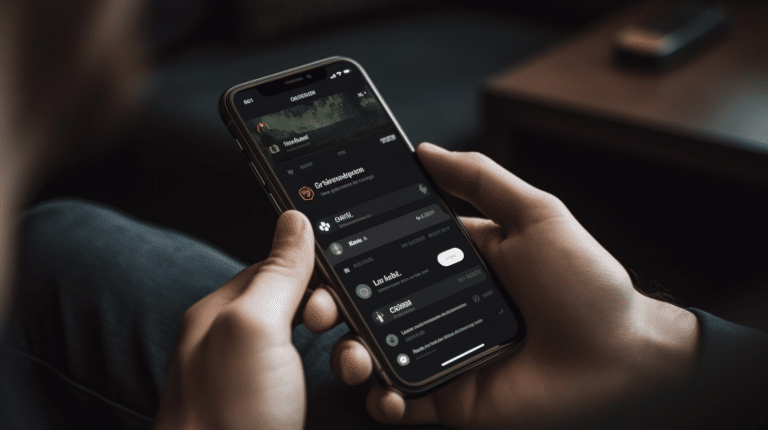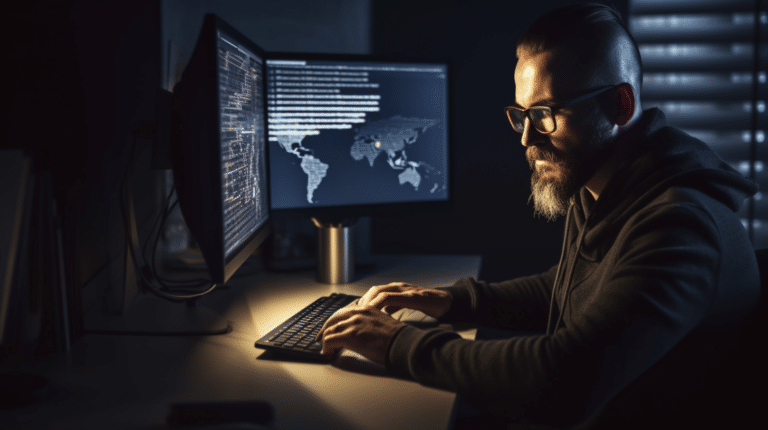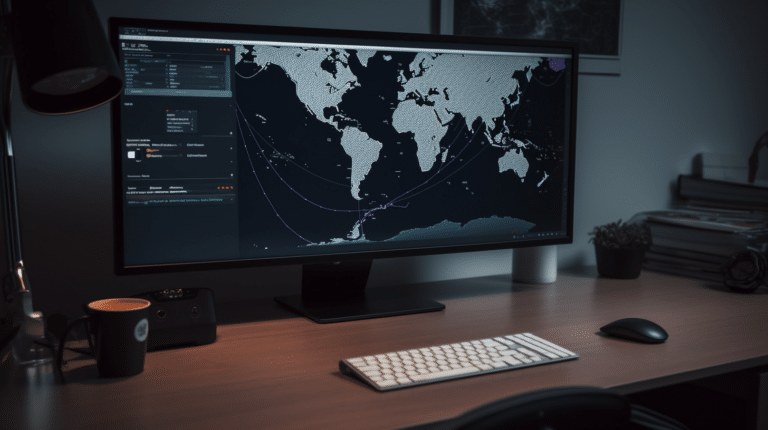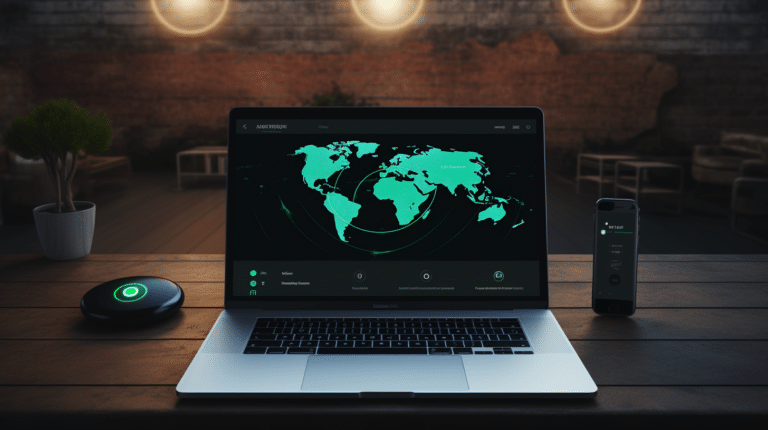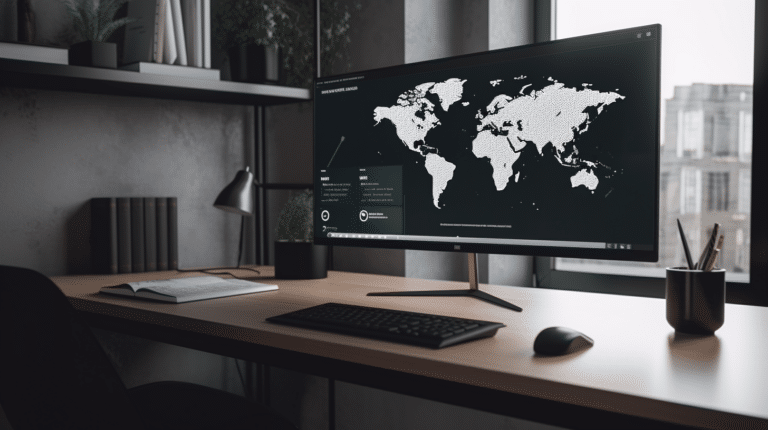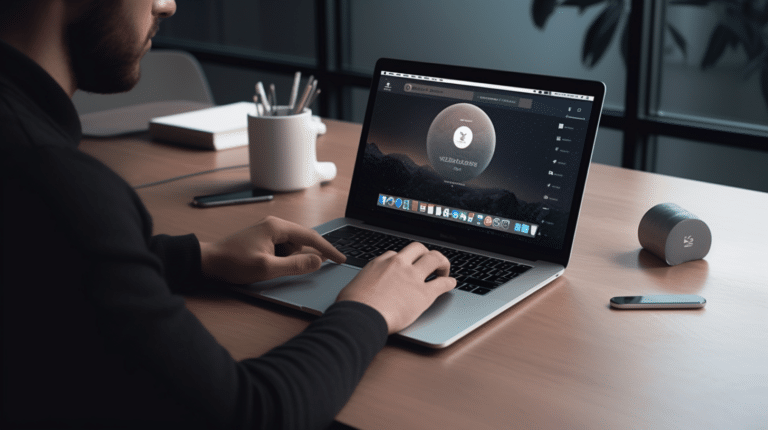Virtual Private Networks (VPNs) have become increasingly popular as internet users seek to protect their privacy and security while browsing the web. VPNs work by encrypting your data and routing it through a secure server, effectively shielding your online activities from hackers, Internet Service Providers (ISPs), and potentially even government surveillance. However, a common question is whether using a VPN is enough to prevent tracking by websites, advertisers, and other third parties.
While VPNs provide a significant level of protection by hiding your IP address, they are not a one-size-fits-all solution for preventing online tracking. Various factors influence the extent to which a VPN protects your privacy, such as its logging policies, security features, and potential IP or DNS leaks. Additionally, certain tracking techniques, such as browser fingerprinting, may still be effective even when using a VPN.
Key Takeaways
- VPNs contribute to online privacy by encrypting data and hiding your IP address, but they cannot entirely prevent tracking.
- The effectiveness of a VPN depends on its security features, logging policies, and reliability in preventing IP or DNS leaks.
- Comprehensive privacy protection may require complementing VPN usage with other strategies, such as addressing browser fingerprinting and selecting reputable VPN providers.
Understanding VPNs
A Virtual Private Network (VPN) is a technology that creates an encrypted connection between your device and a VPN server located in another geographic location. This secure connection allows users to access the internet privately and anonymously, bypassing censorship and geographical restrictions while protecting their data from hackers and cybercriminals.
VPN services are provided by VPN providers who offer various levels of security, speed, and features. Trustworthy VPNs are essential for ensuring your online privacy, as they maintain a strict no-logging policy and use robust encryption protocols like OpenVPN and WireGuard. These protocols ensure the security of your data as it travels through the VPN tunnel.
While using a VPN, your device connects to a VPN server, which then routes your internet traffic through its IP address. This process effectively hides your real IP address and location, making it difficult for third parties like hackers or government surveillance agencies to track your online activities.
There are various types of VPN protocols available for different devices and platforms, each with its advantages and disadvantages. Some popular VPN protocols include:
- OpenVPN: A highly secure and versatile protocol that provides strong encryption and can be used on different platforms.
- WireGuard: A newer and lightweight protocol known for its high-speed performance and strong security.
VPNs offer various benefits to their users, including:
- Privacy: VPNs encrypt your data and hide your IP address, preventing cybercriminals, internet service providers (ISPs), and advertisers from tracking your online activities.
- Geo-Spoofing: VPNs allow you to access geo-restricted content by connecting to a server located in another country, bypassing the content restrictions imposed by some websites and services.
- Secure Public Wi-Fi: By creating an encrypted tunnel between your device and the VPN server, VPNs protect your data from hackers when using public Wi-Fi networks.
In conclusion, VPNs play a crucial role in enhancing your online privacy and security. By choosing a trustworthy VPN provider and understanding the various protocols, you can ensure your data remains secure, and your browsing activity remains private.
How VPNs Prevent Tracking
VPNs (Virtual Private Networks) play a crucial role in enhancing online privacy by preventing tracking. When you connect to a VPN server, your IP address changes, making it difficult for websites and third parties to link your online activities to your real identity. This helps in maintaining your privacy and staying anonymous online.
One of the primary ways a VPN protects you from being tracked is by encrypting your data. When connected to a VPN, all your internet traffic passes through an encrypted tunnel, shielding it from snoopers, including hackers and Internet Service Providers (ISPs). This ensures that even if someone intercepts your data, they cannot easily decipher it.
VPNs also protect you from cookies, which are small text files that websites use to track your browsing habits. Although VPNs cannot block cookies, they can limit the amount of information websites gather by obscuring your real IP address. This makes it harder for trackers to build a comprehensive profile of your online activities.
When selecting a VPN, it’s essential to choose a service that has a strict no-logs policy. A no-logs policy means the VPN provider does not keep any records of your online activities. This ensures that even if the VPN provider is compelled by law enforcement agencies to hand over user data, there’s nothing to reveal.
Additionally, be cautious when using a free VPN as they often lack adequate privacy protections and may sell your data to third parties. Paid VPN services usually offer better security features and more reliable connections, making them a safer option for preventing tracking.
In summary, VPNs are useful tools for safeguarding user privacy and preventing tracking. They achieve this by masking your IP address, encrypting your data, and protecting you from sneaky tracking practices like cookies. It’s essential to choose a reputable VPN provider that prioritizes user privacy and avoids using free VPNs that may compromise your security.
Investigating IP and DNS Leaks
VPNs are commonly used to protect user privacy and prevent tracking by masking their IP address. However, even when using a VPN, there’s a possibility of IP and DNS leaks, which can compromise your online anonymity.
IP leaks occur when your actual IP address is exposed despite using a VPN. This can happen due to incorrect VPN configurations, software issues, or WebRTC vulnerabilities in web browsers. To check for IP leaks, you can visit websites such as ipleak.net, which will display your visible IP address. If it doesn’t match the VPN server’s IP, it indicates a leak.
DNS leaks happen when your VPN fails to route DNS requests through the encrypted VPN tunnel. Instead, these requests are sent to your ISP’s DNS servers, revealing the websites you visit. Some causes of DNS leaks include misconfigurations in VPN settings, operating system issues, or a VPN lacking proper leak protection. You can check for DNS leaks using tools like DNS Leak Test.
To prevent IP and DNS leaks, it’s essential to choose a reliable VPN service with built-in leak protection. Many VPNs offer features such as:
- IPv6 leak protection: Disabling IPv6 traffic ensures that only IPv4 traffic is sent through the VPN tunnel, preventing the leakage of IPv6 IP addresses.
- DNS leak protection: Properly configured VPNs will route all DNS requests through their secure DNS servers, preventing any information from reaching your ISP.
- Kill Switch: In case the VPN connection drops, a kill switch will instantly block all internet traffic, avoiding IP and DNS leaks.
Adjusting VPN settings might help resolve leaks. For instance, manually changing your DNS servers to those provided by your VPN can address DNS leaks. Moreover, disabling WebRTC in your browsers can prevent IP leaks caused by WebRTC vulnerabilities.
In conclusion, regularly checking for IP and DNS leaks and using VPNs with strong leak protection features can significantly reduce the risk of being tracked while using a VPN.
Role of a Kill Switch
A VPN kill switch is a crucial feature included in many VPN apps to help maintain the users’ privacy and security. Its primary purpose is to automatically disconnect the device from the internet when the VPN connection stops working. This feature ensures your IP address, location, or identity do not get accidentally exposed during a VPN disconnection (source).
When you connect to a VPN, your internet traffic gets funneled through an encrypted connection. This process keeps your online activities safe from any external snooping. However, a sudden and unexpected VPN disconnection could leave your device vulnerable, revealing your online activities. This is where a VPN kill switch comes into play by instantly severing the internet connection when the VPN fails (source).
There are two common methods VPN kill switches employ:
- Blocking the internet access when the VPN drops unexpectedly: This approach keeps you safe by only stopping your internet access when the VPN fails without any prior warning, such as in ExpressVPN’s Network Lock on Windows (source).
- Instantly disconnecting your device from the internet when the VPN stops working: This method is more proactive in ensuring your privacy remains intact by cutting off internet access regardless of whether the disconnection was intentional or not (source).
In conclusion, a VPN kill switch serves as an essential safety net, helping users maintain their privacy and security online. By understanding its role and choosing a VPN service that offers this feature, you can confidently browse the internet, knowing that your personal information remains protected under unexpected VPN disconnections.
The Risk of Free VPNs
While Virtual Private Networks (VPNs) are designed to enhance your privacy and security, not all VPNs are created equal. In particular, free VPNs might seem like a cost-effective solution to.prevent tracking, but they can come with their own set of risks and challenges.
Free VPNs often have a limited range of servers and slower connection speeds than paid counterparts. This can make your browsing experience less enjoyable, especially when streaming content or downloading files. Furthermore, if a free VPN’s server network is small, it could be more vulnerable to congestion and thereby decrease your connection quality.
Another important concern about free VPNs is their level of security. They might not utilize strong encryption standards and protocols, which leaves you exposed to potential hacking or other security breaches. Additionally, free VPNs may offer less secure server locations or introduce other vulnerabilities to your system. In some cases, the encryption protocols used by free VPNs are subpar compared to their paid counterparts, increasing your risks even further.
Moreover, the way free VPNs generate revenue might raise questions about their tracking practices. Many free VPNs rely on advertising to sustain their services, which means they may gather your browsing data and sell it to third parties for profit. This is a direct contradiction to the very purpose of using a VPN, which is meant to keep your browsing habits secure and private.
Lastly, free VPNs may lack transparency regarding their data logging policies. In other words, they might not clearly state whether they keep records of users’ browsing activities or not. This lack of clarity can be concerning, especially considering that the primary reason for using a VPN is to maintain your privacy.
In conclusion, while free VPNs might seem like a tempting option to prevent tracking, their potential security vulnerabilities, slower speeds, and questionable data collection practices make them a less-than-ideal choice. For a more secure and reliable solution, consider investing in a reputable paid VPN service with a strong track record of maintaining user privacy and security.
Preventing Browser Fingerprinting
Browser fingerprinting is a technique that allows websites to collect unique information about a user’s browser settings and preferences. This can include data such as the user agent, screen resolution, operating system, and plugins installed. By combining these attributes, a detailed fingerprint can be created, allowing websites or third parties to track and identify users without relying on cookies or similar methods. While VPNs can help protect your online privacy by encrypting your data and hiding your IP address, they may not be sufficient to prevent browser fingerprinting.
If you are using a popular browser like Chrome or Firefox, there are several steps you can take to protect yourself against browser fingerprinting. First and foremost, it is recommended to update your browser to the latest version, as this will often include security patches and improvements designed to help minimize tracking.
Enabling “private browsing” or “incognito mode” can also provide some level of protection, as this limits the amount of information available for fingerprinting. However, it is important to note that this won’t make you completely immune to tracking, as some data will still be accessible to websites.
Installing browser extensions that focus on privacy and reducing tracking, such as uBlock Origin and Privacy Badger, can help combat fingerprinting by blocking certain scripts and requests. Some browsers also have built-in features or options to limit fingerprinting. For example, Firefox offers a setting called privacy.resistFingerprinting which can be enabled in the about:config menu to offer additional protection.
Another option is to use a browser specifically designed with privacy in mind, such as Tor Browser or Brave. These browsers have built-in features to help prevent fingerprinting and other tracking methods.
Lastly, although a VPN can’t directly prevent browser fingerprinting, using one can still contribute to your overall online privacy. By masking your true IP address and location, a VPN makes it more difficult for tracking systems to associate your online activity with your real-world identity. Combining the use of a VPN with the anti-fingerprinting measures mentioned above can significantly enhance your protection against online tracking.
In conclusion, preventing browser fingerprinting requires a multi-pronged approach that combines the use of updated browsers, privacy-focused extensions, and a VPN where appropriate. By implementing these measures, you can minimise the risk of being tracked and maintain your online privacy.
VPNs and Popular Platforms
Virtual Private Networks (VPNs) have become increasingly popular as a tool to safeguard one’s online privacy. Many users wonder how effective they are when used with popular platforms like Netflix, Facebook, and other social media sites.
Using a VPN with Netflix can be a viable option for accessing geo-restricted content. Netflix uses users’ IP addresses to determine their location and content availability. A VPN can mask your actual IP address, allowing you to connect to a server in another country and access region-specific content. Though this may be a potential benefit, it should be noted that Netflix keeps updating its systems to detect and block VPN usage; therefore, it is not always a guaranteed solution.
Facebook and other social media platforms collect vast amounts of data from their users. While a VPN can help you maintain some anonymity by hiding your IP address, it does not provide comprehensive privacy protection. For instance, it cannot prevent tracking by cookies or other online tracking technologies that may be deployed by these platforms. To enhance privacy on social media, it is essential to combine VPN usage with other privacy tools such as browser extensions and adjusting privacy settings on the platform itself.
Keep in mind that although VPNs add an extra layer of security, they are not foolproof against tracking. Advertisers may still be able to gather some information through other means. To further enhance privacy and security, users should also employ other tools like ad blockers, anti-tracking browser extensions, and use secure browsers.
In summary, VPNs can be effective in certain scenarios when used with popular platforms such as Netflix, Facebook, and social media sites, but they are not a one-stop solution for complete privacy. It is essential to adopt a layered approach, combining VPNs with other privacy tools and best practices to protect your online activities.
How VPNs Can Protect From Malware
A Virtual Private Network (VPN) is primarily designed to protect your online privacy and security by encrypting your internet traffic and masking your IP address. However, some VPN services also offer a certain level of protection against malware and spyware.
One way that VPNs can provide protection against malware is by blocking known malicious websites. Many VPN providers maintain a blacklist of websites containing malware, spyware, or phishing threats, and prevent users from accessing them source. This adds an extra layer of protection to your browsing experience.
Another advantage of using a VPN is that it can help minimize the risk of man-in-the-middle (MITM) attacks. These attacks often occur when hackers intercept your data on public Wi-Fi networks. By encrypting your internet connection, a VPN makes it difficult for attackers to steal sensitive information or inject malware into your device.
It is important to note that while a VPN can provide a certain degree of protection against malware, it does not replace the need for a dedicated antivirus software. A VPN cannot detect or remove malware that has already infected your device source.
In summary, investing in a reliable VPN service contributes to your overall online security and protects your privacy. However, to defend against malware and spyware effectively, it is crucial to use additional security measures, such as antivirus software, alongside your VPN.
Choosing the Right VPN
Selecting a reliable and effective VPN service is essential in ensuring your online privacy and avoiding being tracked. Numerous VPN providers are available, but not all are trustworthy and offer the same level of protection. Here are some key tips in choosing the best VPN service for your needs.
Firstly, it is crucial to research the reputation and trustworthiness of VPN providers. Reading reviews, online forums, and testimonials can provide valuable insights into the overall user experience and reliability of a VPN service. Additionally, you may want to consider selecting a VPN provider that has a strict no-logs policy and a transparent privacy policy.
When comparing VPN services, consider the variety of VPN protocols they support. Some popular protocols include OpenVPN, IKEv2, and WireGuard. Each protocol has its own advantages, and support for multiple protocols allows you to choose the best option based on your devices, network conditions, and specific privacy requirements.
Another factor to consider is the global coverage of a VPN provider. A larger network of servers distributed across multiple countries ensures you can connect to a server close to your location for optimal speed and performance. Moreover, having access to servers in various countries enables you to bypass geo-restrictions and access blocked content.
Pricing and subscription options largely vary among VPN services. Many providers offer monthly or annual plans, with some including discounts for longer subscription periods. It’s essential to compare these plans to identify a service that fits within your budget while still offering all the necessary features.
Lastly, customer support is an important aspect to consider when selecting a VPN service. Reliable customer support can help resolve any technical issues, provide guidance on optimal server selection, and ensure a smooth VPN experience.
Taking the time to research VPN providers based on these criteria will enhance your online privacy and ultimately help prevent being tracked.
The Privacy Debate
In the era of increasing online surveillance and data leaks, many internet users have turned to VPNs (Virtual Private Networks) to protect their online privacy. VPNs create an encrypted connection between your device and a remote server, making it difficult for anyone to track your online activities or intercept your data. However, the level of privacy offered by a VPN depends on various factors, such as the provider, server location, and encryption protocols.
It is crucial to understand that not every VPN is created equal. Some providers may not prioritize user privacy as much as others, potentially putting your data at risk. For instance, some VPNs might keep logs of your activity or sell your data to third parties. This is why it is essential for users to scrutinize the provider’s logging policies and general attitude towards privacy before deciding which VPN service to use. You can find an example of such a discussion on CNET.
Furthermore, it is important to be aware that even with a trustworthy VPN service, your online activities can still be monitored by government agencies and other determined entities. They employ advanced methods to deanonymize VPN users, including traffic correlation attacks and timing analysis techniques. In some cases, legal pressure may even force VPN providers to cooperate with authorities and hand over user data.
That being said, using a VPN can provide a significant layer of protection for your online privacy, by shielding your browsing habits from ISPs, advertisers, and malicious actors on public Wi-Fi networks. One of the key features of a VPN is hiding your real IP address, which makes it more challenging for third parties to associate your online activities with your identity. Additionally, a properly configured VPN will prevent data leaks and encrypt your connection, safeguarding your information from potential eavesdroppers.
In summary, while a VPN can significantly enhance your privacy online, it is not a foolproof solution. Your privacy depends on the VPN provider you choose, and there is always a chance that highly-motivated entities can still find ways to track you. It is vital for users to carefully select their VPN provider, understand the limitations of the technology, and employ additional privacy-enhancing tools when necessary.
Frequently Asked Questions
Can VPNs stop ISPs from monitoring browsing history?
Yes, VPNs can help prevent ISPs from monitoring your browsing history. When you use a VPN, your internet traffic is encrypted and passes through a secure tunnel, making it difficult for your ISP to log or monitor your browsing activities. However, keep in mind that some VPN providers may keep logs of your internet activities, which could potentially be accessed by third parties.
Are VPN users protected from hackers?
VPNs can provide a layer of protection against hackers by encrypting your internet connection, reducing the risk of eavesdropping on your online activities. However, they cannot fully protect you against all types of cyber attacks, such as phishing attempts or malware infections. To be protected from hackers, it is essential to use a combination of security measures, including up-to-date antivirus software, strong passwords, and multi-factor authentication.
Do VPNs hide location data effectively?
Yes, VPNs can effectively hide your location data by masking your real IP address with that of a VPN server. This makes it difficult for websites, services, and third parties to determine your actual location. Keep in mind, though, that some VPN services are more effective at hiding your location than others, and even the best VPNs cannot guarantee complete location anonymity.
Can employers trace browsing history through a VPN?
If you use a VPN while connected to your employer’s network, there is a possibility that they may still be able to trace your browsing history, depending on their monitoring capabilities and tools. However, using a VPN may make it more difficult for your employer to monitor your online activities. Remember that using a VPN to bypass workplace restrictions may violate company policies, so it is crucial to be aware of any relevant rules within your organization.
Can emails be traced when using a VPN?
Using a VPN can make it more difficult for your emails to be traced, as it hides your real IP address and location data. However, it does not provide complete anonymity for your emails, as your email provider and recipients can still see your email address. It is essential to use additional security measures, such as encrypted email services, for enhanced privacy.
What information can still be tracked while using a VPN?
Even when using a VPN, certain information may still be tracked or exposed. For example, your VPN provider may keep logs which could contain information about your browsing history, connection times, or IP addresses. Additionally, if your VPN connection experiences a leak, your real IP address and other data could be exposed. Finally, websites and services you access may still use cookies or other tracking mechanisms to gather information about your online behavior. To minimize tracked information, use a combination of privacy tools like ad blockers, cookie blockers, and secure browsing habits.

